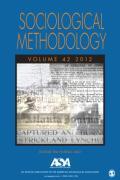
Kristian Bernt Karlson, Anders Holm
Logit and probit models are widely used in empirical sociological research. However, the common practice of comparing the coefficients of a given variable across differently specified models fitted to the same sample does not warrant the same interpretation in logits and probits as in linear regression. Unlike linear models, the change in the coefficient of the variable of interest cannot be straightforwardly attributed to the inclusion of confounding variables. The reason for this is that the variance of the underlying latent variable is not identified and will differ between models. We refer to this as the problem of rescaling. We propose a solution that allows researchers to assess the influence of confounding relative to the influence of rescaling, and we develop a test to assess the statistical significance of confounding. A further problem in making comparisons is that, in most cases, the error distribution, and not just its variance, will differ across models. Monte Carlo analyses indicate that other methods that have been proposed for dealing with the rescaling problem can lead to mistaken inferences if the error distributions are very different. In contrast, in all scenarios studied, our approach performs as least as well as, and in some cases better than, others when faced with differences in the error distributions. We present an example of our method using data from the National Education Longitudinal Study.